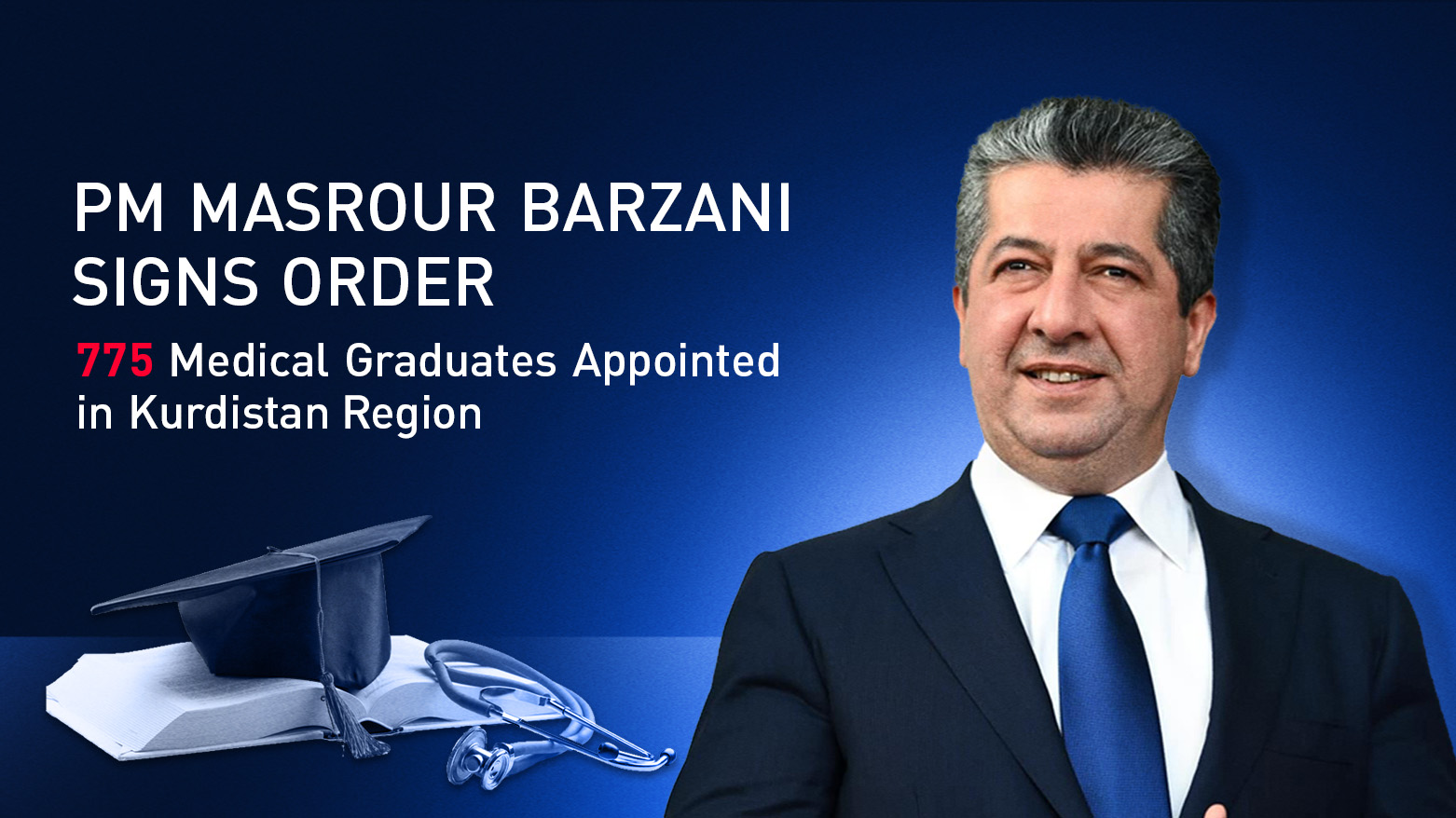KRG Appoints 775 Medical Graduates with Internal Funds as Baghdad Faces Protests for Inaction
PM Masrour Barzani ordered the appointment of 775 medical graduates using KRG internal funds, a "critical relief" for the health sector. The move comes as hundreds of graduates in Baghdad protest the federal government's failure to provide them with employment.

ERBIL (Kurdistan24) – In a decisive move to address critical staffing shortages within its healthcare system, Kurdistan Region Prime Minister Masrour Barzani has signed an order for the permanent appointment of 775 recent medical college graduates, a significant step funded entirely by the region's internal revenues. The measure, announced on Monday, was hailed by the Health Minister as a "critical relief measure" for the health sector and stands in stark contrast to events in the federal capital, where on the same day hundreds of medical graduates protested government inaction on their own long-standing demands for employment.
The order, issued on Monday, formalizes the appointment of graduates from the 2023-2024 academic year across the Kurdistan Region’s higher education institutions, including the universities of Sulaimani, Hawler Medical, Duhok, Zakho, Koya, Garmiyan, and the University of Kurdistan Hewlêr.
According to a statement released by the Kurdistan Regional Government (KRG), the 775 graduates will be appointed within the Ministry of Health with their entitled titles, salaries, and allowances. The KRG explicitly stated that the funding for these positions would be sourced from its own internal revenues, underscoring a proactive approach to resolving a pressing internal need.
The government's statement emphasized that the decision was driven by necessity, citing a "significant need within the Kurdistan Region's health institutions for the services of rotating resident physicians."
This action aligns with the stated priorities of the KRG's ninth cabinet, which has consistently identified the development and advancement of the health sector as one of its main concerns.
The statement noted that despite facing numerous crises, difficult economic conditions, and what it described as the limitation of health assistance from the federal government, the ninth cabinet has prioritized providing medicine, medical supplies, and strengthening the region’s health infrastructure.
Providing further context on the decision, KRG Minister of Health Saman Barzanji described the Prime Minister’s order as a crucial intervention.
"Masrour Barzani, the Prime Minister of the Kurdistan Region, as always, wisely decided to appoint a number of medical college graduates," Barzanji told Kurdistan24 on Monday, confirming that "these doctors will be appointed permanently."
He explained that the move became necessary after repeated attempts to secure federal funding for the positions were met with silence.
The Health Minister noted that, according to the budget law, the federal government in Baghdad is required to allocate the necessary budget for the appointment of medical graduates across the country, including in the Kurdistan Region.
"We sent several delegations to Baghdad and they tried to get the medical college graduates appointed, but Baghdad gave no response," Barzanji stated. "Therefore, Prime Minister Masrour Barzani decided to appoint them."
The minister further elaborated that the Iraqi government should have also provided the Kurdistan Region's share of new job positions to compensate for staffing gaps created by a large number of retirements.
"Due to the retirement law, a large number of health employees of all titles have retired, which has created staff shortages in many hospitals and health centers," he added, highlighting the systemic pressure on the region's healthcare services.
Minister Barzanji stressed the immediate and positive impact this new cohort of physicians will have on public health services. "We will begin the procedures for the graduates to start their work as soon as possible so they can enter the health system," he said, reiterating the urgency and importance of the Prime Minister's order. "The decision was very important; it was a critical relief measure for the health system."
The KRG's decisive action to absorb its medical graduates into the public sector presented a sharp contrast to the situation unfolding simultaneously in Baghdad.
On the very same Monday, Iraqi media outlets reported that approximately 600 graduates of various medical specializations gathered in Al-Umma Park in the center of the federal capital, protesting the government's failure to provide them with employment.
The protestors, who later marched towards the heavily fortified Green Zone, were demanding their appointment and the full implementation of Law No. (6) of 2000, which pertains to the appointment of graduates from health-related departments.
This was not an isolated incident; on multiple previous occasions, hundreds of medical graduates in Baghdad have organized similar protests in front of the Ministry of Health and the Green Zone, demanding their legally mandated appointments from the government.
The juxtaposition of these two events—one an executive order providing immediate employment in Erbil, the other a public protest demanding long-overdue action in Baghdad—highlights the diverging approaches to public sector employment and healthcare management between the regional and federal governments.
While the KRG opted to utilize its own resources to overcome bureaucratic and political deadlock with the federal government to fill vital roles, graduates in Baghdad continue to face uncertainty, compelled to take to the streets to claim rights they believe are guaranteed to them by law.
The appointment of the 775 doctors in the Kurdistan Region is thus not only a significant reinforcement of its health sector but also a clear policy statement on self-reliance in the face of federal inaction.